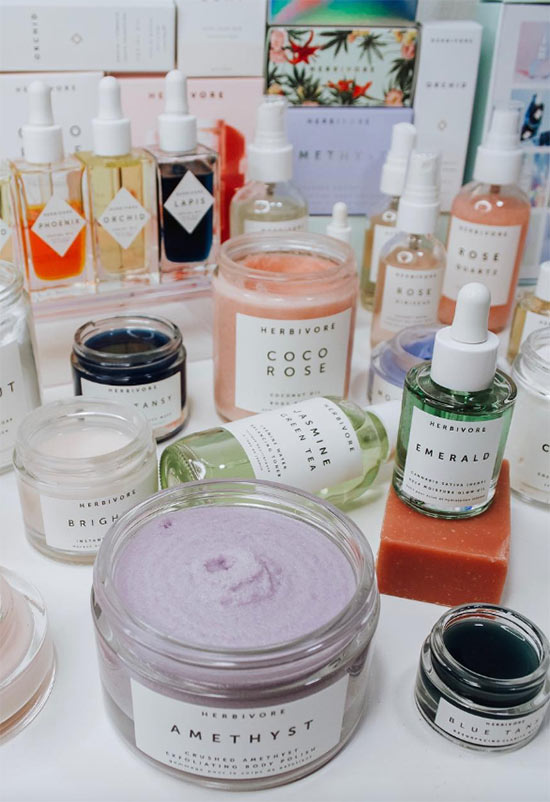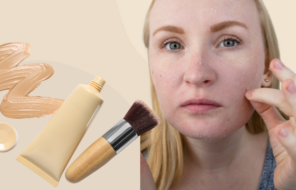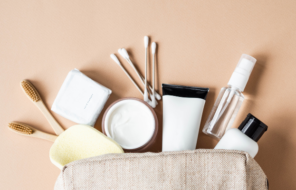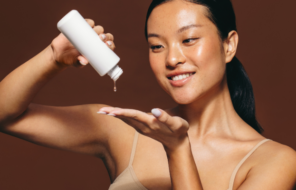I am so excited to finally write about hemp oil for skin because let me tell you, this ingredient is having a serious resurgence suddenly! In recent months, it seems as though hemp oil is getting a rebrand, with all the brands and bloggers talking about the much more controversially named cannabis sativa seed oil.
The truth is cannabis sativa oil is exactly the same hemp seed oil that we’ve been using in skin care for decades! As the more psychoactive strains of the cannabis plant are becoming increasingly legalized, we see more attention paid to the plant as a whole.
I’ve already written an extensive piece on CBD skin care, another cannabis-derived ingredient that is having a moment in the skincare world, but this time, I’m turning my attention to tried and true hemp oil and the benefits it has for the skin.
In this article, I’ll give you all the concrete details about hemp seed oil for skin, including how it’s made and how it works in skin care. To keep you from getting confused, I’ll explain the difference between hemp seed oil and CBD oil, and I’ll go over what all the hemp oil benefits are for the skin as well as which skin types it is best for. I’ll go over the potential side effects of hemp seed oil, and finish off with all of my favorite hemp oil uses, so you can get your skin glowing.
In this article:
- What Is Hemp Seed Oil?
- Hemp Seed Oil vs. CBD Oil vs. Cannabis Oil
- Hemp Oil Benefits for Skin
- Possible Side Effects to Hemp Oil Uses in Skin Care
- Which Skin Types Is Hemp Seed Oil Best for?
- How to Use Hemp Oil for Skin?
What Is Hemp Seed Oil?
Also known as cannabis sativa oil or simply hemp oil, hemp seed oil is the oil derived from the seeds of the cannabis sativa plant. This oil is most commonly produced through a cold-pressing process, in which the seeds are removed from the hemp plant and put into a machine that presses them tightly in order to expel the oil.
In most cases the oil will go through some refining afterwards, in order to remove impurities. Hemp oil itself is greenish in color, with an earthy smell and a silky texture that is not very heavy but not super light either.
Hemp seed oil is composed of around 50% linoleic acid (a.k.a. omega-6), 20% alpha-linolenic acid (aka omega-3), as well as smaller percentages of gamma-linolenic acid, oleic acid, and stearidonic acid. Linoleic acid (omega-6), which makes up the bulk of the hemp seed oil, is an excellent skincare ingredient, since it acts as a skin-softening and strengthening emollient that doesn’t exacerbate acne breakouts.
Alpha-linolenic acid (omega-3) is similarly non-comedogenic, and it is phenomenal for boosting the skin’s barrier functions. Both of these fatty acids are thought to have soothing effects on the skin, as well, so hemp seed oil may help reduce redness and sensitivity in the skin.
Hemp seed oil also contains a healthy amount of skin-repairing and antioxidant vitamin E, which is important for protecting the skin from free radical damage and preventing premature aging.
Of course, since it is a natural ingredient, the precise composition varies from oil to oil depending on factors like where the hemp was harvested and the season in which it was harvested.
You will see some sources talk about the “perfect ratio” in hemp seed oil. What they are referring to is the fatty acid composition of the oil, and particularly the approximate 3:1 ratio of omega-6 to omega-3. While I personally haven’t seen any convincing evidence that the ratio itself is particularly healthful or special, it is undeniable that these particular fatty acids are phenomenal for the skin.
Hemp Seed Oil vs. CBD Oil vs. Cannabis Oil
Let’s start by clearing up one thing. Hemp seed oil, hemp oil, and cannabis sativa oil all refer to the same wonderful skincare oil I talked about earlier. This oil has been sold legally for decades, since it does not contain any THC, which is the psychoactive compound in cannabis.
The other compound that is often discussed in relation to cannabis sativa seed oil is CBD. CBD, which is actually short for cannabidiol, is a phytocannabinoid that is indeed found in hemp oil. CBD is not psychoactive, but it does have some medicinal properties.
CBD oil is currently used as an anti-seizure medication for particular types of childhood epilepsy, and in skincare it is starting to become popular thanks to preliminary research that shows that it might be a good anti-inflammatory.
These CBD oil products are produced by isolating CBD from hemp in a lab, and then adding that CBD in a precise amount to an oil or a skincare formula. CBD is not legal in all places, so consult local laws before buying products that contain it.
While the hemp seed oil used in skin care may contain trace amounts of CBD, it is nothing at all like purchasing CBD oil with declared amounts of the compound. Occasionally you will see a product advertised as containing CBD when in reality all it has is hemp oil – this is a mistake on the part of the manufacturer, as on a skincare ingredient list CBD will be mentioned as “cannabidiol”, while hemp seed oil will be listed as cannabis sativa oil.
The other word you might see thrown around is cannabis oil. While cannabis oil might refer to cannabis sativa seed oil (i.e. hemp oil), it is much likelier that it refers to an oil that contains either THC, CBD, or both. If the oil contains THC then it is a psychoactive product, in which case it will not be legal to possess if you live in a place where marijuana is criminalized.
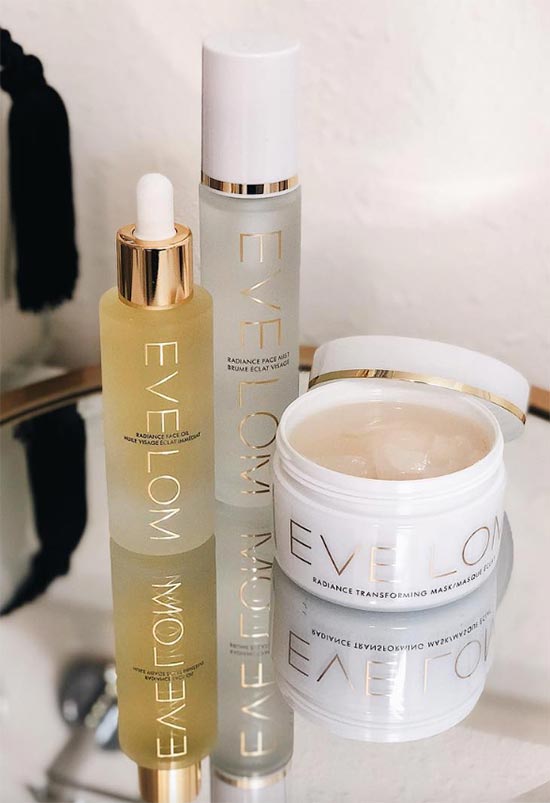
Hemp Oil Benefits for Skin
Ok, so you know which are the best hemp seed oil products to get, but it’s important to learn also what hemp oil benefits your skin will get using them.
Moisturizing
As with any botanical oil, one of the key hemp seed oil benefits is its ability to act as an emollient. Emollients are skincare ingredients that, when applied topically to the skin, are able to sink into the stratum corneum (top layer of skin) and fill in any gaps between the dead skin cells that make it up.
This makes the top layer of skin softer to the touch, more flexible, and more resistant to damage. It also makes the skin less prone to dehydration, since water cannot evaporate out of the skin through the layer of oil.
Because hemp seed oil is fairly light, those with dry skin sometimes find that it is not a heavy enough emollient on its own. In those cases, a facial oil might be a better choice, since it combines hemp oil with other skincare oils that have a richer texture.
Additionally, on its own hemp seed oil cannot infuse the skin with water, so it shouldn’t replace a moisturizer. It can be used after a cream, to help lock that moisture into the skin, a few drops of it can be mixed with a moisturizer to boost it, or you can simply use a face cream that is formulated with hemp seed oil as well as water and humectants.
Skin-Soothing
Hemp seed oil is found to be very soothing to the skin, which those with sensitive skin that becomes red and irritated easily will definitely appreciate. It works to help soothe the skin because of its high vitamin E content, as well as thanks to its barrier-repairing properties.
Non-Comedogenic
The main hemp seed oil benefit for those with acne-prone skin is that it’s a gentle, simple ingredient that will not break them out! The fatty acid profile of cannabis sativa seed oil is a non-comedogenic one, and as many people can attest, using it does no break them out.
Research on human sebum (the mixture of oils, waxes, and a few other compounds that the skin produces) has shown that people whose skin is acne-prone tend to have a higher amount of oleic acid and a lower amount of linoleic acid in their facial oil. It follows that oils high in linoleic acid and low in oleic acid should not cause breakouts.
Quite the opposite, the anti-inflammatory effects of the oil actually mean that it can reduce the redness and swelling of active breakouts, and help speed up skin healing.
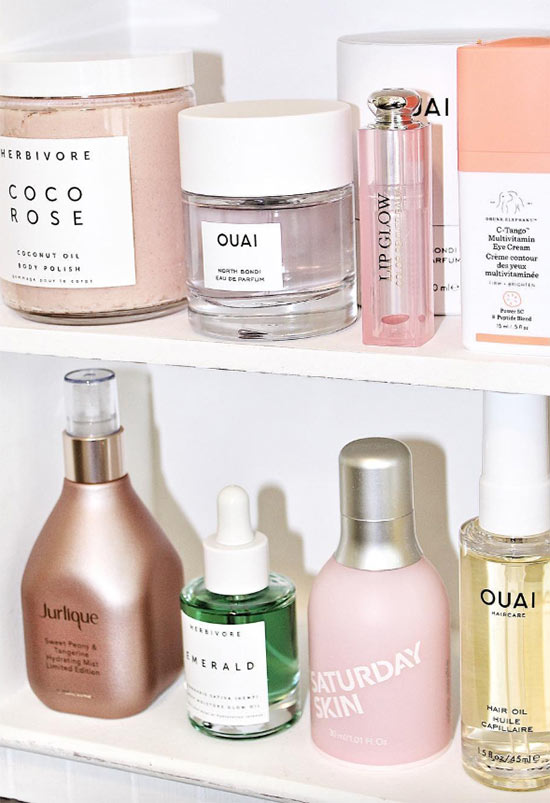
Anti-Aging
Cannabis sativa seed oil helps to keep the skin looking youthful in two ways. The first is as an antioxidant, an ingredient that wards off the free radical damage caused by sun and pollution. It is the vitamin E in the hemp seed oil that gives it this protective, anti-aging ability.
The second way in which cannabis sativa seed oil helps prevent signs of premature aging like fine lines and wrinkles is as a moisturizer. By keeping the skin soft and strong, the skin in the short term looks brighter and younger, while in the long term it is overall stronger and more resistant to damage.
Possible Side Effects to Hemp Oil Uses in Skin Care
Hemp seed oil is considered a very safe and gentle skincare ingredient that should not have any issues. With that being said, it’s important to patch test it before using, the same way you should patch test any new skincare products or ingredients that you intend to use.
Hemp seed oil is more fragrant than many other skincare oils, so people with skin that is extremely sensitive to fragrances may find that it does irritate them a bit, so this only reinforces the need for patch testing.
To patch test for sensitivity, apply hemp seed oil to a small patch of skin on your neck or inner upper arm. Do this for a few days in a row, and if no negative reaction occurs you are probably fine to start applying it to your face.
If you’re patch-testing for acne, apply it to a small area where you normally break out. Do this for a few days in a row, and if you don’t see an increase in pimples then hemp seed oil will not be an issue for you!
In other cases, some people simply don’t like the way hemp seed oil smells, in which case they might prefer to mix it with a few drops of an essential oil or to simply try a different skincare oil with a similar fatty acid profile (walnut oil in particular is a good alternative).
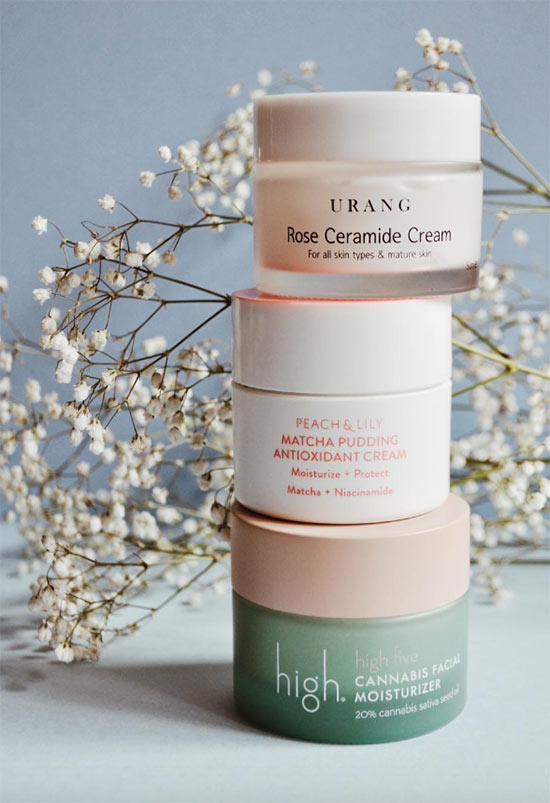
Which Skin Types Is Hemp Seed Oil Best for?
Hemp seed oil is best for skin that sits in the middle, between combination-dry to combination-oily, and it’s also excellent for sensitive and acne-prone skin. While it is a moisturizing oil it’s not as moisturizing as heavier oils like coconut oil or shea butter, so those with very dry skin might find it’s not enough for them.
On the other hand, those with very oily skin sometimes find that even light, non-comedogenic oils like hemp seed oil make them feel a little greasy, in which case they might prefer totally oil-free skincare products. If you want to use hemp seed oil skincare products, rather than the true oil, make sure to read our list of the very best to see which product is good for which skin type!
Hemp Oil Uses in Skin Care: How to Use Hemp Oil?
Hemp seed oil can be used for the skin all on its own, as well as in a particular skincare product. In another article, I’ve listed all kinds of different hemp seed oil skincare products, including oils, masks, moisturizers, and serums. Each one of these products should be used as directed by the retailer.
However, if you want to use pure hemp seed oil on your skin, there are a few ways you can go about it! One thing to keep in mind though is that hemp seed oil has a very short shelf life when compared to other oils, so it must be kept either in the fridge or freezer when it’s not being used.
If you don’t like the herbaceous smell of hemp seed oil then add a few drops of your favorite, skin-safe essential oil to it to mask the scent. If your skin is acne-prone, you might want to add an antimicrobial essential oil like tea tree oil.
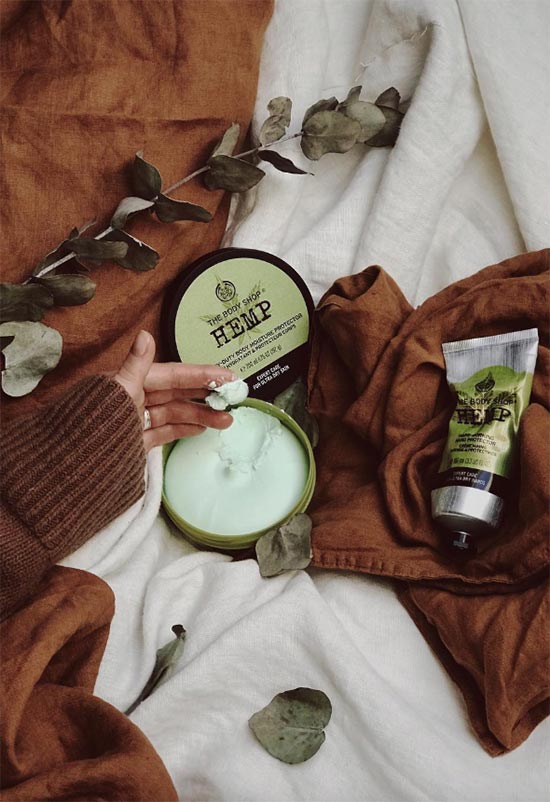
Hemp Seed Oil for Skin After Moisturizing
I don’t recommend using hemp seed oil as the only leave-on skincare step, since the skin needs both water and oil, not just water. With that being said, hemp seed oil can be a fabulous step after the skin has already been hydrated, especially in the evenings.
At the end of your skincare routine, after you’ve cleansed your skin and hydrated it either with an essence, serum, or light moisturizer, just apply a couple of drops of hemp seed oil to your skin. Massage it in with upward circular motions as you would any skincare ingredient. If you find that hemp seed oil on its own is not rich enough, you can combine it with a heavier oil of your choice.
If you have skincare products in your routine that are more occlusive than hemp seed oil (this includes many sleep packs and overnight masks), then you will want to layer it over your skin after the hemp seed oil.
Hemp Seed Oil for Skin Cleansing
Despite being quite light, one of the best hemp oil uses is as a makeup remover or cleanser. It can dissolve makeup, sunscreen, and other impurities quite well, so anyone who likes oil cleansing will definitely want to give hemp seed oil a try!
There are two ways you can cleanse with cannabis sativa seed oil.
- The first is the method I prefer: pouring a small amount in your hand, and then just rubbing it into the skin as you would any other cleanser until it dissolves all makeup. Be extra careful around the eye area, and only use your ring finger to massage it in, especially at the lash line where it is perfect for dissolving mascara. Once that’s done you can use a facial cloth, sponge, or paper towel to wipe it all off your skin.
- The second method is to use hemp seed oil as you would any other makeup remover. Pour some hemp seed oil over a cotton pad, and then use the cotton pad to wipe off your makeup. You might want to hold the cotton pad against your eyes for a few seconds before wiping to make sure all eye makeup is thoroughly dissolved. You might need to go through a few cotton pads in order to thoroughly remove heavy makeup.
Usually, after cleansing with an oil a bit of its residue will stay on your face. If your skincare routine includes heavy-duty actives like glycolic acid or retinol, you will likely want to do a second cleanse with a gel or foam cleanser, but if it only consists of hydrating or soothing products then you can simply follow up with the rest of your routine without doing a second cleanse.
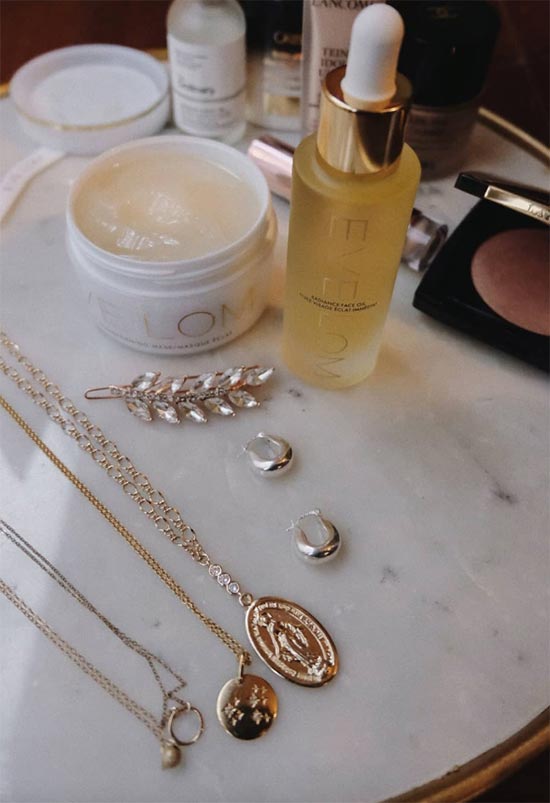
Hemp Seed Oil Mixed into Moisturizer
The last way you can enjoy all the hemp oil benefits is by mixing a few drops of it with your moisturizer or serum! You can do this every day or save it for days when you think your skin needs that extra moisturizing touch.
In your hand mix a few drops of hemp seed oil with your favorite moisturizer, and then apply the moisturizer to your skin as you normally would!
Some sources might suggest adding a few drops of hemp seed oil directly into your moisturizer bottle or jar, but I strongly recommend against that – the hemp seed oil can disrupt the balance of preservatives in your cream, and cause it to go bad earlier than it normally would. It is much better to mix things up fresh the second before you apply them to your skin.
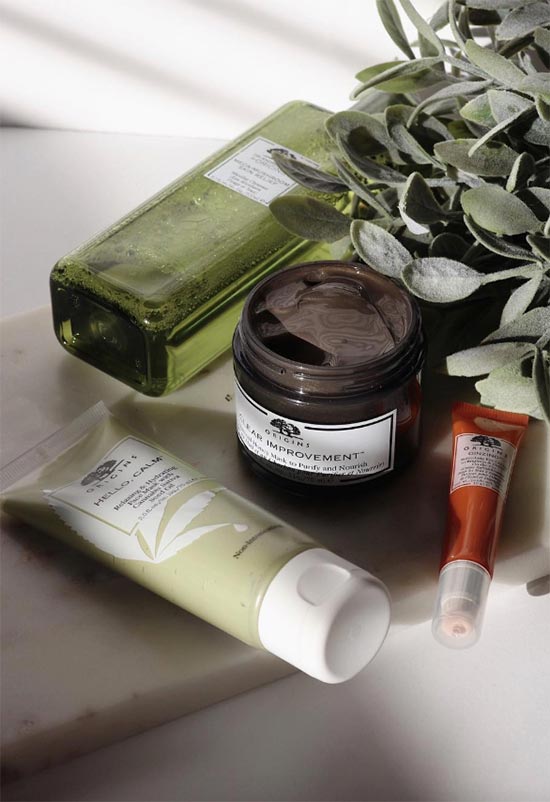
Photos via @the.skincare.diary, Instagram

